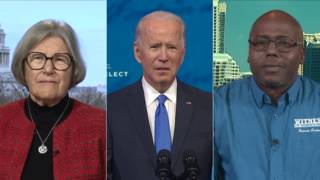Hi there,
I believe that people who are concerned about the climate catastrophe, economic and racial justice and war and peace, are not a fringe minority, not even a silent majority, but the silenced majority—silenced by the corporate media. That's why we have to take the media back—especially now. But we can't do it without your support. Thanks to a group of generous donors, all donations made today will be DOUBLED, which means your $15 gift is worth $30. With your contribution, we can continue to go to where the silence is, to bring you the voices of the silenced majority. Every dollar makes a difference. Thank you so much!
Democracy Now!
Amy Goodman
Hi there,
I believe that people who are concerned about the climate catastrophe, economic and racial justice and war and peace, are not a fringe minority, not even a silent majority, but the silenced majority—silenced by the corporate media. That's why we have to take the media back—especially now. But we can't do it without your support. Thanks to a group of generous donors, all donations made today will be DOUBLED, which means your $15 gift is worth $30. With your contribution, we can continue to go to where the silence is, to bring you the voices of the silenced majority. Every dollar makes a difference. Thank you so much!
Democracy Now!
Amy Goodman
Non-commercial news needs your support.
We rely on contributions from you, our viewers and listeners to do our work. If you visit us daily or weekly or even just once a month, now is a great time to make your monthly contribution.
Please do your part today.
HeadlinesJanuary 03, 2011
Palestinian Protester Dies After Israeli Tear Gas Attack
A Palestinian activist died on Friday after Israeli forces shot her with tear gas during a peaceful protest against the West Bank separation wall in the village of Bil’in. Jawaher Abu Rahma died from respiratory failure. The tear gas used by the Israeli forces was reportedly manufactured by Combined Systems, a U.S. company based in Jamestown, Pennsylvania. On Sunday, Israeli police arrested 11 pro-Palestinian activists for taking part in a protest outside the home of U.S. Ambassador to Israel James Cunningham, north of Tel Aviv. During the protest, an empty tear gas canister was thrown toward the ambassador’s residence. The Israeli activist Jonathan Pollak took part in Friday’s protest in Bil’in.
Jonathan Pollak: “This death was caused by their brutality, by the fact that they are using tear gas that was banned in Europe in the ’60s and ’70s because it is lethal. But here, on Palestinians, they continue using it.”
Palestinian lawmaker Mustafa Barghouthi also condemned the killing of Jawaher Abu Rahma.
Mustafa Barghouthi: “The death of Jawaher Abu Rahma, who was only 37 years old, was the result of the Israeli military use of concentrated tear gas in very huge amounts and quantities against peaceful demonstrators. This is one form of the violence that the Israeli army is using against Palestinian civilian demonstrators who are peacefully demonstrating against the wall, against apartheid and against occupation. And it’s a reflection of the feeling of Israel of impunity, above international law.”
Jawaher Abu Rahma was the sister of Bassem Abu Rahma, who was killed in April 2009 when Israeli soldiers fired a tear gas grenade at his chest at another demonstration in Bil’in. On Sunday, Israeli soldiers shot and killed an unarmed Palestinian man as he approached a checkpoint in the northern West Bank holding a glass water bottle.
Report: More than 10,000 Died in 2010 in Afghanistan
Agence France-Presse is reporting more than 10,000 people died in Afghanistan in 2010, including thousands of civilians. NATO spokesperson Brigadier General Josef Blotz admitted that the U.S. military surge led to more violence.
Brigadier General Josef Blotz: “Now, this actually led to an upturn in violence, and we expected this. But obviously this is a necessary step, a necessary phase in the overall strategy. And before it gets better, unfortunately it has to get worse, and this is what we saw towards the end of 2010.”
U.S. Air Force to Deploy New Surveillance System in Afghanistan
The Washington Post is reporting the U.S. Air Force is preparing to deploy to Afghanistan a new airborne surveillance system called Gorgon Stare, which will be able to transmit live video images of physical movement across an entire town. The Big Brother-like system is made up of nine video cameras mounted on a remotely piloted aircraft that can transmit up to 65 live images to soldiers on the ground or to analysts tracking enemy movements. Air Force Maj. Gen. James Poss said, “Gorgon Stare will be looking at a whole city, so there will be no way for the adversary to know what we’re looking at, and we can see everything.” The Air Force has been exponentially increasing surveillance across Afghanistan. The monthly number of unmanned and manned aircraft surveillance sorties has more than quadrupled since the beginning of 2009.
Pakistan Faces Political Turmoil
Pakistan is facing political turmoil after a key party pulled out of the ruling coalition. President Asif Ali Zardari’s Pakistan Peoples Party has now lost its majority in parliament and faces possible collapse if the opposition unites to pass a vote of no-confidence.
21 Christians Killed in Egyptian Church Bombing
Seventeen people have been arrested in Egypt following a bombing at a Coptic Christian church that killed 21 worshippers attending a midnight mass on New Year’s Day. The bombing has been described as the worst sectarian violence in Egypt in a decade.
Ahmed Al-Tayyeb, grand imam of Al-Azhar University: “It is necessary that all Egyptians — and I do not want to say Muslims or Christians, but just 'Egyptians' — are needed today, more than at any time in the past, to join their hands together and, as has happened previously, embrace the crescent and the cross, to stand against such conspiracies that have targeted Christians today, but which tomorrow will not differentiate between Muslim and Coptic.”
WikiLeaks: U.S. Diplomats Helped Market Boeing Jets Overseas
Newly disclosed diplomatic cables released by WikiLeaks has revealed details about how U.S. diplomats have actively promoted the sale of commercial jets built by the U.S. company Boeing. The New York Times reports U.S. diplomats were acting like marketing agents, offering deals to heads of state and airline executives in Saudi Arabia, Bahrain, Jordan, Turkey and other countries. The WikiLeaks documents also suggest that demands for bribes, or at least payment to suspicious intermediaries, still take place.
Bank of America Prepares for Possible Disclosures by WikiLeaks
Executives at Bank of America are scrambling to deal with the possible fallout from a massive leak of secret bank documents by the whistleblowing website WikiLeaks. In late November, WikiLeaks founder Julian Assange announced plans to release internal documents from a major U.S. bank. Assange did not name the bank, but in a previous interview, Assange said WikiLeaks had obtained a hard drive of a Bank of America executive containing five gigabytes of data. Over the past month, Bank of America has launched a broad internal investigation hunting for any sign that its systems might have been compromised. The New York Times reports the bank has also hired the private consulting firm Booz Allen Hamilton to manage the review. In addition, the bank has sought advice from several top law firms about legal problems that could arise from a disclosure, including the bank’s potential liability if private information was disclosed about clients.
African Leaders Pressure Ivory Coast President to Cede Power
Leaders from Nigeria, Sierra Leone, Cape Verde and Kenya are heading to Ivory Coast today in an attempt to persuade Ivory Coast President Laurent Gbagbo to cede power to longtime opposition leader Alassane Ouattara. Both Gbagbo and Ouattara have claimed victory in November’s disputed election. Ouattara has received the backing of the international community, including the Economic Community of West African States, which has threatened military action if Gbagbo does not agree to step aside. Military chiefs from the 15-nation bloc have reportedly met to begin strategizing what sort of assault they would use if talks fail. On Sunday, Gbagbo appeared on national television and accused Ouattara of staging a coup.
Laurent Gbagbo: “Let’s not kid ourselves. Let’s not let ourselves be abused by words. It’s about an attempted coup d’état brought in under the banner of 'international community.' This action is destined to bring in, by force if they need to, as the leader of this country a man who Ivorians didn’t choose by their votes — as my rival has lost in the presidential elections from November 28, 2010.”
Dilma Rousseff Sworn in as Brazilian President
Dilma Rousseff has been sworn in as the new president of Brazil, replacing Luis Inácio Lula da Silva. Rousseff is Brazil’s first female president.
3,100 Killed in Ciudad Juárez in 2010
Mexican officials say more than 3,100 people were killed in drug violence in the border city of Ciudad Juárez last year, the bloodiest year to date. Overall, more than 30,000 people have been killed in drug violence in Mexico since President Felipe Calderón launched an offensive against the cartels four years ago.
Australian Floods Kill 10 People
In Australia, at least 10 people have died in massive flooding that has spread across an area the size of Germany and France combined. Up to 200,000 people have been affected. Earlier today, the northern Australian city of Rockhampton became entirely cut off due to the rising waters. Meanwhile, the roof of a movie complex in the town of Bathurst collapsed, trapping dozens of moviegoers.
Jerry Brown to be Sworn in as Governor of California
In California, Democrat Jerry Brown is being sworn in today as the state’s new governor, replacing Arnold Schwarzenegger. On New Year’s Day, three other new governors were sworn in: Andrew Cuomo in New York, Susana Martinez in New Mexico, and Rick Snyder in Michigan.
Arizona Suffers from Record Number of Foreclosures
For a third year in a row, the state of Arizona has suffered a record number of home foreclosures. Nearly 66,000 homeowners lost their homes between January and November, an increase of 12 percent from the number of homes taken in 2009, which also set a record.
RNC Members Turn Against Michael Steele
The website Politico is reporting Republican National Committee chairman Michael Steele faces an all-but-impossible path to reelection this month. A majority of the RNC’s 168 members have indicated that they will not support Steele for another term.
Judith Miller Criticizes WikiLeaks Founder Julian Assange
Former New York Times reporter Judith Miller is back in the news. Last month, it was revealed she had started writing for the right-wing website NewsMax. And on Sunday, she appeared on Fox News and criticized WikiLeaks founder Julian Assange.
Judith Miller: “Julian Assange may be a bad journalist, but he is a journalist.”
Question: “Why is he a bad journalist?”
Judith Miller: “Because he didn’t care at all about attempting to verify the information that he was putting out, or determine whether or not it would hurt anyone.”
While at the New York Times, Judith Miller was often criticized for not verifying her own stories. She wrote several of the key articles that claimed Iraq had an extensive weapons of mass destruction program ahead of the Iraq invasion. Miller once said, “[M]y job isn’t to assess the government’s information and be an independent intelligence analyst myself. My job is to tell readers of the New York Times what the government thought about Iraq’s arsenal.”
Hong Kong Democracy Activist Szeto Wah Dies at 79
The longtime Hong Kong democracy activist Szeto Wah has died at the age of 79.
Most popular
- 1
- 2
- 3
- 4
Non-commercial news needs your support
Please do your part today.











Media Options